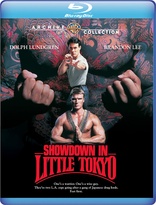Showdown in Little Tokyo Blu-ray Movie
HomeShowdown in Little Tokyo Blu-ray Movie 
Warner Archive CollectionWarner Bros. | 1991 | 78 min | Rated R | Jul 21, 2015
Movie rating
6.5 | / 10 |
Blu-ray rating
| Users | 3.0 | |
| Reviewer | 3.0 | |
| Overall | 3.0 |
Overview
Showdown in Little Tokyo (1991)
A raised-in-Japan L.A. supercop and his new partner kick into high gear when the Japanese mob makes a play for power.
Starring: Dolph Lundgren, Brandon Lee, Cary-Hiroyuki Tagawa, Tia Carrere, Toshishiro ObataDirector: Mark L. Lester
| Martial arts | Uncertain |
| Crime | Uncertain |
| Comedy | Uncertain |
| Adventure | Uncertain |
| Action | Uncertain |
Specifications
Video
Video codec: MPEG-4 AVC
Video resolution: 1080p
Aspect ratio: 1.78:1
Original aspect ratio: 1.85:1
Audio
English: DTS-HD Master Audio 2.0 (48kHz, 24-bit)
Subtitles
English SDH
Discs
25GB Blu-ray Disc
Single disc (1 BD)
Playback
Region free
Review
Rating summary
| Movie | 2.5 | |
| Video | 4.0 | |
| Audio | 4.0 | |
| Extras | 0.5 | |
| Overall | 3.0 |
Showdown in Little Tokyo Blu-ray Movie Review
"Showgirls" in Little Tokyo
Reviewed by Michael Reuben July 20, 2015There's a familiar category of films that are "so bad they're good". They're usually best experienced under the influence of intoxicants and in the company of fellow fans with whom to share derisive commentary. Paul Verhoeven's Showgirls is a notorious example. Less famous is the late Brandon Lee's first American feature, Showdown in Little Tokyo, which was marked as a B movie from the moment Dolph Lundgren was cast as the lead. But even with low expectations, the film that director Mark Lester (Firestarter) turned in to the studio was so disappointing that studio brass activated the usual damage control strategy of having a new editor recut the picture to its bare essentials, shortening the running time to a trim 78 minutes and rushing from one action beat to another, so that audiences would never have time to get bored. Even with the recut, the studio had so little faith in Showdown that it made a minimal investment in prints and advertising. The U.S. release was limited to just 140 theaters, and in most territories the film went directly to video. With such a lack of faith, failure becomes a self-fulfilling prophecy. At a cost of just $8 million, Showdown failed to make back its production budget. But then, two years later, Brandon Lee was killed on the set of The Crow. Suddenly interest was revived in everything in which he'd ever appeared, and Showdown became a cult classic. Whenever a promising career is tragically cut short, fans have to make do with a limited body of surviving work, but Showdown is hardly Brandon Lee at his best. The drastic cuts imposed by the studio eliminated virtually anything resembling character development. The editing choices are often unflattering to the actors' performances; the pacing is bizarre; and the plot logic doesn't bear scrutiny. Indeed, if anyone ever wanted to do an action movie variant of Mystery Science Theater 3000, they could use Showdown to inaugurate the series. That isn't to say that the film is unwatchable, but you should know what to expect. Showdown is the latest release from the Warner Archive Collection, which continues to give first-class treatment to obscurities that might otherwise never see a Blu-ray release. As far as I can tell, WAC is releasing the R-rated version that played in U.S. theaters and was previously issued here on DVD in 1998. An unrated version with approximately 20 seconds of additional footage has appeared on DVD in other territories (but not the U.S.).
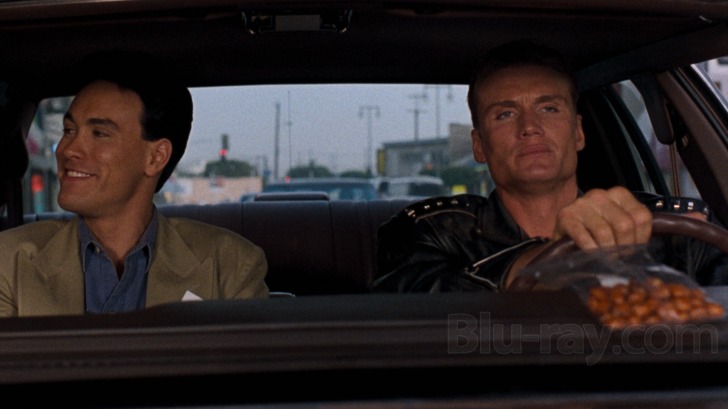
There's rich potential for comedy in the mismatched pairing of LAPD Dets. Chris Kenner and Johnny Murata. Both of them are martial arts experts, but only Murata looks the part, because he's played by Brandon Lee, while Kenner can't avoid resembling the chiseled slab of beefcake that is Dolph Lundgren. Just to keep things interesting, though, it is Kenner, not Murata, who was raised in Japan, the excuse being that he was a military brat. He speaks fluent Japanese and follows the code of the samurai. Murata, who is supposed to be Japanese-American (despite the fact that Lee was Chinese-American), was born and raised in the Valley, likes "malls, pizza and MTV" and barely knows a word of Japanese. Kenner is notorious for going through partners. A quick scene in the station house shows his many former partners, all of them Asian-American, wishing Murata good luck or offering condolences on his new assignment. If the film's original script by the team of Stephen Glantz and Caliope Brattlestreet (The Watsons Go to Birmingham) explored this role reversal in any depth, it didn't survive either the filming or the studio edit. What remains is generic repartee that could be plugged into almost any buddy cop film and would sound just as forced in all of them, including this gem (which has become famous):
Murata: Kenner, just in case we get killed, I wanted to tell you, you have the biggest dick I've ever seen on a man. Kenner: Thanks. I don't know what to say. Murata: How about "Don't get killed"? Kenner: Don't get killed. Murata: You too.The arch-villain, and the other half of the "showdown" of the title, is a ruthless yakuza boss named Funekei Yoshida (Cary-Hiroyuki Tagawa), who has come to America to take over, well, everything, starting with criminal operations in L.A.'s Little Tokyo. Aided by his chief lieutenant, Sato (Toshishiro Obata), Yoshida begins with the operations of Little Tokyo's current kingpin, Tanaka (Philip Tan), who owns a club and runs an illegal kickboxing operation. With Tanaka out of the way, Yoshida establishes his headquarters at the club, ruthlessly eliminating one of the girls, Angel (Renee Griffin), who was a snitch for Kenner, while making a personal slave out of Angel's friend, a singer named Minako (Tia Carrere), who becomes the story's damsel-in-distress. Hurriedly (and, at the film's breakneck pace, unnecessarily) inserted is an extra motivation for Kenner beyond law enforcement in the form of a Bruce Wayne-like backstory that has him seeking revenge against the yakuza for killing his parents when he was a boy. (Think Jack Napier in Tim Burton's Batman.) In a longer film with more varied pacing and a lead actor with greater range, this history might have been developed in an interesting direction, but here it flashes by just as quickly as Brandon Lee's athletic kicks and flips. Pared to its essentials, Showdown is little more than a series of brutal encounters, spiced with macho posturing, sexual sadism and gratuitous nudity, all of them leading to a final battle between Kenner and Yoshida (with Murata and Sato duking it out as a warm-up act). Their concluding encounter, armed with samurai swords, is fairly satisfying, but one has to swallow a lot of improbabilities along the way. These include one of the least convincing biker gangs ever to appear in a Hollywood film (they're both customers and distributors for Yoshida's new brand of crystal meth) and a sequence where Kenner, who is supposed to be a seasoned samurai warrior, hides Minako in his personal retreat—because no one would ever think to look for them there, right? Less than a day passes before Yoshida's men burn the place to the ground.
Showdown in Little Tokyo Blu-ray Movie, Video Quality 
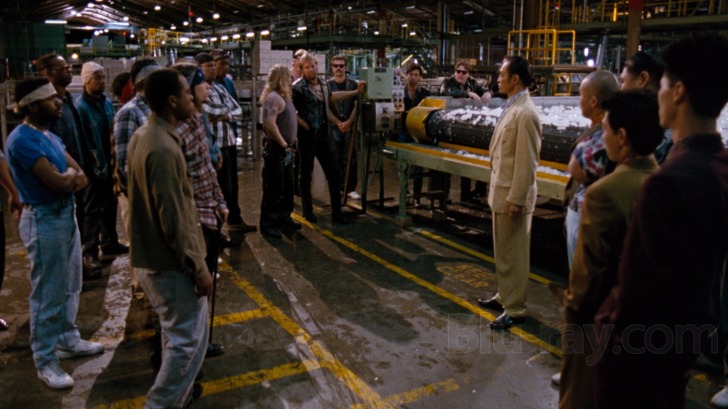
Showdown in Little Tokyo was photographed by Canadian cinematographer Mark Irwin, who shot most of David Cronenberg's early films through The Fly and has had long-running partnerships with Wes Craven (Scream) and the Farrelly Brothers (There's Something About Mary). Irwin's hallmark is invisibility. His lighting and camera work don't draw attention to themselves. He's won four awards from the Canadian Society of Cinematographers, but he'll never win an Oscar, because no one ever thinks to themselves during one of his films, "Wow, that's beautiful photography!" They're too busy following the story. The Warner Archive Collection has newly transferred Showdown at 2k from an interpositive, and the results are impressive. WAC's 1080p, AVC-encoded Blu-ray sports a beautifully film-like image with an organically natural grain pattern, solid blacks (essential for the many nighttime sequences) and vivid colors that brings out the full palette of Little Tokyo and its many residents and visitors. The elaborate body tattoos sported by the various yakuza (which are a plot point), as well as the lurid scene in the club formerly owned by Tanaka, are both vivid and life-like, without the pumped-up digital saturation that one often sees in today's productions. These are colors that could actually exist. Detail is plentiful, whether in closeups of faces or in long shots of elaborate environments like the Red Dragon brewery. As has become its standard practice, WAC has mastered Showdown at an average bitrate of 35 Mbps. Even at that high rate, the film fits on a BD-25, because it is so short and has no major extras. It should be noted that Showdown was shot on film, an analog medium, and WAC has preserved the look of that medium. Recent comments in the Blu-ray.com forum have reminded me that such a look still raises concern among viewers who have grown accustomed to digital photography, digital post-production and digital projection. The belief continues that any Blu-ray image with a "soft" or "grainy" texture must somehow be a botched job. On the contrary, an image like that on WAC's Blu-ray of Showdown is a model of how this type of production should be preserved in a high-def medium. It is certainly possible to apply digital software to eliminate visible grain, sharpen the image and enhance the appearance of detail (though only the appearance), but it is precisely those practices that have been repeatedly condemned by videophiles, and with good reason. Occasional instances may require the use of such tools (e.g., to clean up an image from a badly deteriorated source), but Showdown in Little Tokyo is not one of them.
Showdown in Little Tokyo Blu-ray Movie, Audio Quality 
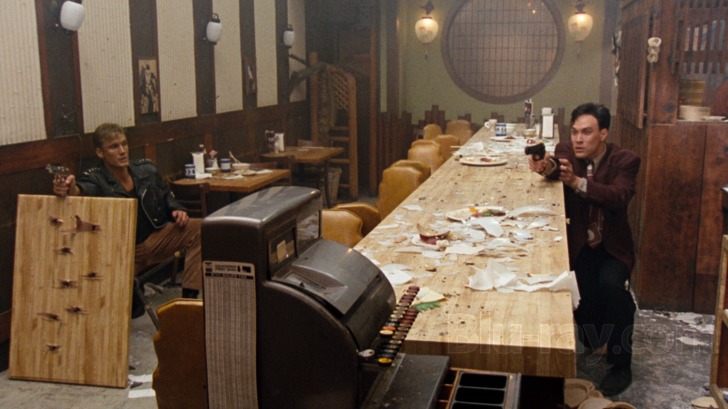
Showdown in Little Tokyo was released in Dolby Surround, which has been encoded on Blu-ray in lossless DTS-HD MA 2.0. It's a serviceable mix that provides a good surround experience when played back through a decoder, lending an effective ambiance to scenes like the opening fight competition, the bathhouse brawl and the battle at Yoshida's auto yard. The dynamic range is broad enough to lend appropriate impact to the gunshots, car crashes, flames and body blows. The dialogue is clear, and the score by former Broadway conductor David M. Frank (Above the Law, Hard to Kill) effectively imitates Hans Zimmer's style of importing Japanese musical elements into Western film music demonstrated in Black Rain two years earlier.
Showdown in Little Tokyo Blu-ray Movie, Special Features and Extras 
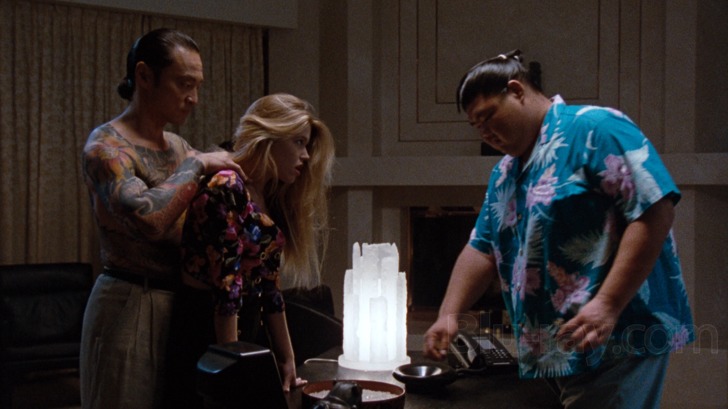
The disc contains no extras other than a trailer (1080p; 1.78:1; 1:26), but this is more than Warner's 1998 DVD had.
Showdown in Little Tokyo Blu-ray Movie, Overall Score and Recommendation 
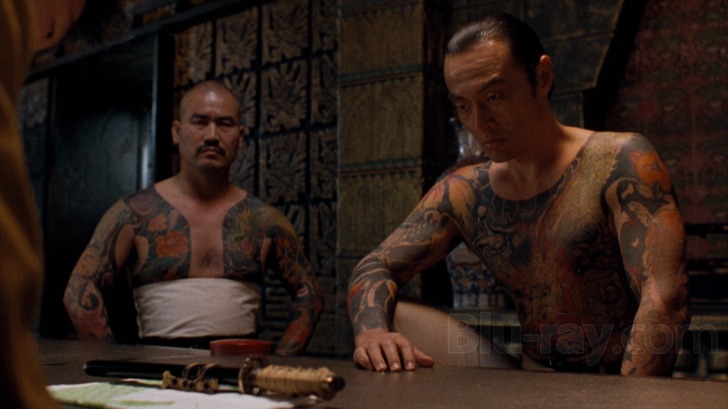
A scene early in Showdown demonstrates what it might have been. Dolph Lundgren's Kenner intervenes to protect the proprietor of his favorite café, Mama Yamaguchi (Takayo Fischer), from a group of Yoshida's thugs threatening her for protection money. Kenner wipes the floor with them, but in the process he does more damage to Mama's establishment than the thugs ever intended. It's also the occasion when Kenner and Brandon Lee's Murata meet for the first time. From the way Mama plays the scene, it's obvious that Kenner's wholesale destruction of her place was intended to be comical, but it doesn't work, because Lundgren can't pivot back and forth between he-man and clown in the deft style that made Stallone and Schwarzenegger such durable action stars. (Imagine Lundgren trying to play Harry Tasker in True Lies. On second thought, don't.) When Brandon Lee enters, he brings a certain lightness with him, but it isn't enough to offset Lundgren's leaden presence. Buddy cop movies require chemistry between the buddies. Without it, all you can do is race to the end credits as fast as possible, which is what the studio edit accomplished. For Brandon Lee fans, WAC has done their usual fine job. For anyone seeking a better film, see The Crow or Rapid Fire.
Similar titles
Similar titles you might also like

The Glimmer Man
1996

Rush Hour 3
2007

Absolution
2015

The Executioner
1974

Best of the Best: Without Warning
1998

Ninja Assassin
2009

Marked for Death
1990

End of a Gun
2016

Black Belt Jones
Warner Archive Collection
1974

Passenger 57
1992

Rush Hour
1998

Rush Hour 2
2001

They Call Me Bruce?
1982

Delta Force 2: The Colombian Connection
1990

John Wick: Chapter 3 - Parabellum
2019

Rapid Fire
Limited Edition to 3000
1992

John Wick: Chapter 4 4K
2023

Into the Sun
2005

The Green Hornet
2011

Blind Fury
1989
